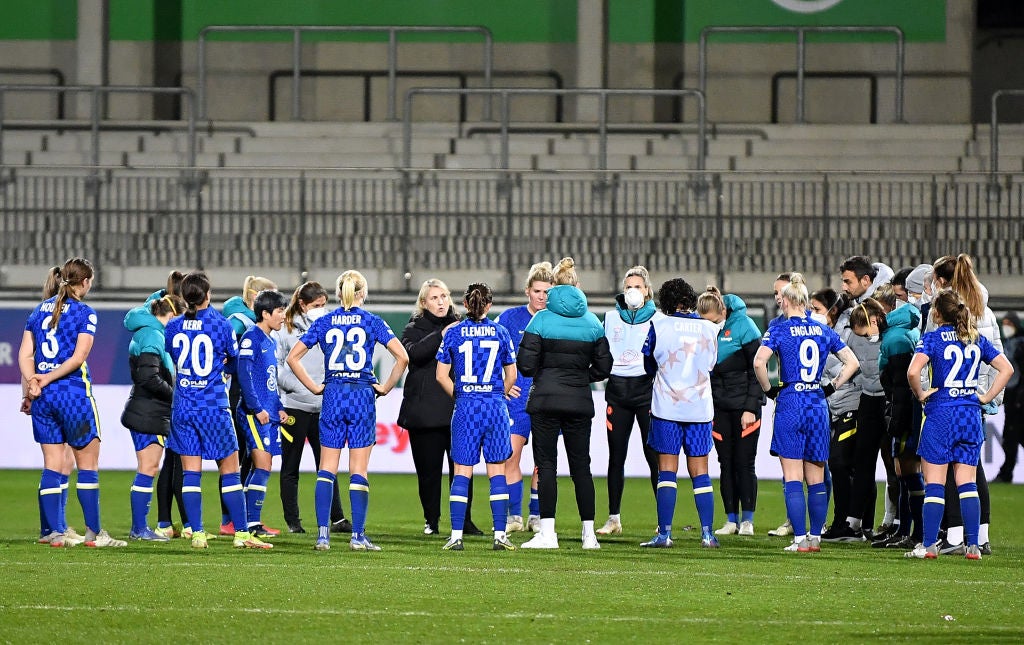Women’s Champions League preview: England’s clubs face tougher test after Euro 2022 glory
While the Lionesses conquered Europe this summer and the Women’s Super League continues to break records in England, its clubs have struggled to make their mark in the Champions League

“You have to earn it, every single game,” Kadeisha Buchanan explained as she discussed her move from the champions of Europe to the champions of England. After winning five Champions League medals and five French league titles with Lyon in just six seasons, the defender was entitled to want a change of scene. Buchanan arrived at Chelsea following the club’s third Women’s Super League title in a row but as their defence began at newly promoted Liverpool, the Canada international was provided with the perfect example of the competitiveness and unpredictability she was looking for, as Liverpool came from behind to win 2-1.
There were plenty of reasons for Buchanan to choose Chelsea and the WSL as her next move, especially after a record-breaking summer in England which saw the Lionesses win the Euros on home soil. The WSL was already going from strength to strength, with Chelsea leading the way under Emma Hayes on the pitch, and England’s victory over Germany at Wembley had the potential to accelerate its development. But Buchanan was also enticed by something more, by the resources that allowed a club near the bottom of the table to shock its defending champion. It was an insinuation that the WSL was the place to be and, in some ways, the best league in the world.
Except just as Buchanan arrived, the WSL lost four of its biggest names. All four departed from Manchester City, three at the end of their contracts, but their destinations were revealing. Georgia Stanway was the first to leave, signing a three-year deal with Bayern Munich. It was followed by Lucy Bronze joining Barcelona, after weeks of speculation surrounding the former Ballon d’Or winner. Caroline Weir then moved to Real Madrid before, a day before the transfer window closed, Barcelona signed Keira Walsh for a world-record fee.
Whatever the motivations were from each player to leave City, there was a common trend among the clubs they had joined, as revealed by Stanway when she told The Independent’s Miguel Delaney last month that the Champions League was a significant factor in her decision. “That was something that massively enticed me here,” she said. “Last year I didn't even get to play in the Champions League. That’s something you want to be a part of, it’s the biggest tournament in Europe.”
City’s slip had been their failure to qualify for the revamped Champions League group stages at the start of that season, but there was a wider trend among England’s clubs as well. Star players want to compete in the latter stages of the Champions League but by the end of the campaign, there were no English clubs in the semi-finals. Chelsea had suffered a group-stage exit, thrashed 4-0 by Wolfsburg in their final game, before Arsenal were knocked out by the same opponent in the quarter-finals. Since the WSL went professional, only Chelsea in 2021 have reached the Champions League final and Arsenal’s title in 2007 is the last time an English club won a major honour in Europe.
Chelsea’s dominance in the WSL under Hayes and their 19 wins out of 22 matches last season might not suggest an overly competitive top flight, but Buchanan was not wrong to suggest that those clubs near the bottom are stronger relative to those in the other top leagues across Europe. But while the gap between top and bottom may not be as vast, the evidence in recent years illustrates that what the other leagues may lack in comparison to the WSL, they make up for with the superiority of their strongest teams in Europe.
In other ways, therefore, the WSL is far from the best league in the world. Uefa’s coefficient places the top-flight leagues in France, Spain and Germany above England in terms of their European performance over the past five seasons. Similarly, England’s top club Chelsea are sixth in the club coefficient standings, behind Lyon, Barcelona, Wolfsburg, Paris Saint-Germain and Bayern Munich. While England’s Euro 2022 victory under Sarina Wiegman proved they are the strongest European nation heading into next summer’s World Cup, its clubs still have work to do on the continental stage.

Whether or not Chelsea and Arsenal, or whoever may qualify in future seasons, make the step up is an important moment for the WSL, too. The 20-player shortlist for this week’s Women’s Ballon d’Or was revealing. Although Arsenal and England forward Beth Mead finished second, the list seemed to be weighted in favour of the Champions League elite. Last year’s Champions League finalists Lyon and Barcelona had five and four nominees respectively, while only three England players from the Lionesses’ Euro 2022 triumph were nominated. There was no place for Stanway, Walsh or the Scotland international Weir after they had missed out on the Champions League, but you imagine that would change next year if they play a crucial part in their team reaching the semi-finals or beyond.
The challenge is for Arsenal and Chelsea to beat them to it, and the group stages will provide immediate clues as to how far they can both go this season. The London rivals have both drawn difficult groups. Arsenal face not only the defending champions Lyon, with their opening game away to the French side tonight, but also the champions of Itay, Juventus, who knocked out Chelsea in the group stages last season. Chelsea, meanwhile, face a trip to PSG in their opening match and will have Real Madrid – who knocked out City in the play-off round at the start of this season – to contend with if they are to reach the quarter-finals.
Ahead of the start of this season’s Champions League it can feel like, along with the Lionesses making their breakthrough this summer and the year-on-year growth of the WSL, cracking Europe is the third and final frontier for English football. The standards are high and, like the previous two examples, the expectation is for clubs to rise to the challenge.
Join our commenting forum
Join thought-provoking conversations, follow other Independent readers and see their replies
Comments


Bookmark popover
Removed from bookmarks